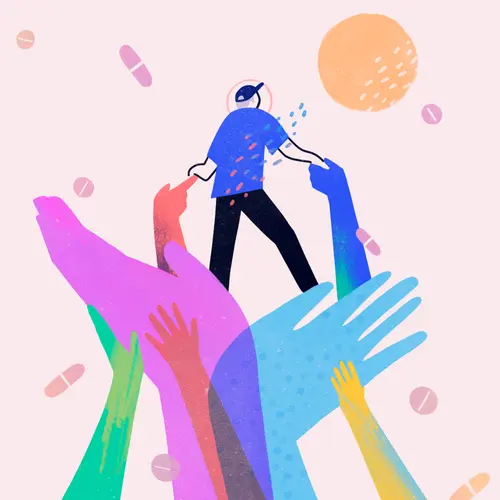People with HIV can live longer, healthier lives than ever before thanks to HIV medicines and other therapies. These include once-a-day pills that treat the infection.
But HIV treatments can be expensive. HIV care involves a type of medication called antiretroviral therapy (ART) and regular visits with your doctor. One study estimated that costs of this care could run anywhere between $1,800 to $4,500 each month during a person’s lifetime. Most of this, about 60%, comes from the high cost of ART medications.
The cost is more than most people can afford on their own. But there are options available to ease the financial strain so you can get the medication you need.
What Affects Costs?
The price of HIV treatment varies based on a few things. For example, some name-brand medications cost more than others. The average wholesale price for the drug emtricitabine/tenofovir disoproxil fumarate (Truvada) is nearly $1,700 for a 30-day supply of tablets in the U.S., while the drug lamivudine (Epivir) costs around $400.
If there’s a generic version of your medication, that can lower your costs. For example, while the drug tenofovir disoproxil fumarate (Viread) costs about $1,400 per month, the generic version may cost anywhere between $110 and $1,200. But not all drugs have a generic available, especially if they are newer. Still, it’s always worth asking your doctor or pharmacist if there’s a less expensive version of your medication.
Sometimes HIV can become resistant to more common drugs, so they don’t work as well in controlling your condition. That means your doctor will need to prescribe something much stronger but more costly. The drug ibalizumab-uiyk (Trogarzo), for example, which you take through a shot instead of in a pill, can cost about $9,000 a month.
If you’re getting treatment for both HIV and another condition, this will also make your costs go up. For example, up to nearly one-third of people with HIV also have hepatitis C. Treatments for both conditions work well, but they are expensive because you will still need to keep taking your HIV antiretroviral therapy along with your hepatitis C medications.
Lab tests can also raise costs, and some studies have shown that nearly half of lab tests that doctors order for people with HIV weren’t necessary. Talk to your doctor to make sure you understand why you are getting each type of test.
Private Insurance
Many people get private health insurance through their employers or through a family member’s job, but you can buy a plan for yourself as an individual, although it’s usually more expensive. Depending on your plan, your insurance may cover some or all of your HIV treatments.
If you purchase a plan through a government marketplace under the Affordable Care Act (ACA), it covers many benefits that people with HIV need, including:
- Outpatient care
- Emergency services
- Overnight stays at the hospital
- Mental health services like counseling or talk therapy
- Prescription drugs
- Rehabilitation
- Lab tests
- Preventive care
Wherever you get your insurance, the Affordable Care Act guarantees that you won’t be denied coverage because you have HIV and that there won’t be lifetime limits on your benefits. You can visit HealthCare.gov to explore your options.
Medicare and Medicaid
If your insurance plan does not pay for the HIV care you need, or it covers some of the cost but you are still struggling to handle deductibles and co-pays, you may qualify for federal resources like Medicare or Medicaid. These are important sources of health care for people with HIV -- about a quarter of people with HIV get their health insurance coverage through Medicare.
Medicare is for people more than 65 years old, people under 65 with certain disabilities, and people of all ages with advanced kidney disease. Medicaid provides help for people with low incomes, older people, those with disabilities, and some families and kids, depending on where you live. Medicaid is a federal program, but your state decides how much coverage you actually get. If you’re eligible, you can enroll in Medicaid at any time.
Contact a local HIV/AIDS service organization who can help you figure out what programs or services you’re eligible for. The Health Resources and Services Administration, part of the U.S. Department of Health and Human Services, also has phone numbers for state HIV/AIDS services on its website.
Financial Aid Programs
The Ryan White HIV/AIDS Program is a federal government program for people with HIV or AIDS who have trouble paying for care. The program fills gaps in care that aren’t covered by private health insurance or other federal funding. It also helps states operate AIDS Drug Assistance Programs (ADAPs) so they can offer financial support for prescription drugs. Talk to your local service organization about help you might be able to receive through your state’s ADAP. You can use the HIV.gov HIV Testing and Care Services Locator to find a Ryan White clinic in your area.
Many drug manufacturers also offer patient assistance programs for people who are eligible. Some pharmacies offer discounts on certain drugs, perhaps by negotiating discount prices by buying medications in bulk. Other organizations, such as the Department of Veterans Affairs, have drug assistance programs of their own. Ask your treatment clinic or pharmacy about support options in your community that could apply to you.
You may also be able to take part in a clinical trial for a new HIV/AIDS treatment that isn’t yet available to the general public. Often, the medicines being tested in these trials will be free of charge. Clinical trials are safe, but they are still experimental, so there may be a higher risk of side effects. Talk to your doctor about whether this might be a good option for you.

